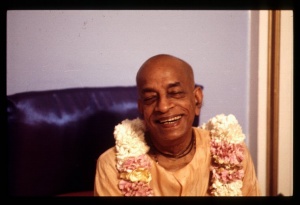CC Madhya 19.205 (1975)

A.C. Bhaktivedanta Swami Prabhupada
Below is the 1996 edition text, ready to be substituted with the 1975 one using the compile form.
TEXT 205
- taṁ matvātmajam avyaktaṁ
- martya-liṅgam adhokṣajam
- gopikolūkhale dāmnā
- babandha prākṛtaṁ yathā
SYNONYMS
tam—Him (Kṛṣṇa); matvā—considering; ātmajam—own son; avyaktam—unmanifested; martya-liṅgam—manifested as if perishable; adhokṣajam—beyond the perception of the senses; gopikā—mother Yaśodā; ulūkhale—to the mortar; dāmnā—with rope; babandha—bound; prākṛtam—an ordinary child; yathā—like.
TRANSLATION
“‘Although Kṛṣṇa is beyond sense perception and is unmanifest to human beings, He takes up the guise of a human being with a material body. Thus mother Yaśodā thought Him to be her son, and she bound Lord Kṛṣṇa with rope to a wooden mortar, as if He were an ordinary child.’
PURPORT
This verse from Śrīmad-Bhāgavatam (SB 10.9.14) is in reference to Lord Kṛṣṇa’s exhibiting Himself like an ordinary child before mother Yaśodā. He was playing like a naughty boy, stealing butter and breaking butter pots. Mother Yaśodā became disturbed and wanted to bind the Lord to a mortar used for pounding spices. In other words, she considered the Supreme Personality of Godhead an ordinary child.